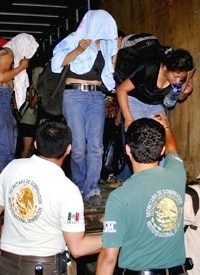
Mexican authorities recently stopped two tractor trailers containing a total of 513 illegal aliens. They were caught at a checkpoint, using X-ray equipment, in the county’s southern state of Chiapas, which borders Guatemala. They are, to some degree, lucky to have been caught before entering Mexico. Otherwise, they might have been in big trouble given Mexico’s stiff immigration law that severely punishes illegal aliens, and which is much tougher than U.S. immigration law. Even worse, they would have faced the depredations of corrupt public officials and criminal gangs had they made it past the checkpoint and been dumped somewhere in Mexico.
CNN reportsthat the illegals, who were crammed into the trailers like sardines, had paid $7,000 apiece to hitch a ride supposedly all the way to the United States. They hailed from across the globe: El Salvador, Ecuador, China, Japan, Guatemala, India, Nepal, Honduras, and the Dominican Republic.
Ever the humanitarian nation, Mexico has promised to contact the appropriate consulates and send them back home. But the high-profile nature of the case assures they won’t be mistreated, unlike other illegals.
Mexico’s Immigration Law
Had these illegals not been intercepted but instead entered Mexico, and then been let loose, things could have been different. Mexico, unlike the United States, takes immigration seriously, as J. Michael Waller showed in a report for the Center for Security Policy.
Published in 2006 during the debate about the McCain-Kennedy amnesty bill, Waller’s report demonstrates just how tough Mexican law is. “Mexico, which annually deports more illegal aliens than the United States does,” he writes, “has much to teach us about how it handles the immigration issue.”
Immigrants are allowed in only if they will contribute to Mexican society, and the authorities are required to keep track of them. As well, “foreigners with fake papers, or who enter the country under false pretenses, may be imprisoned.” Those “who fail to obey a deportation order are to be punished” and “[f]oreigners who are deported from Mexico and attempt to re-enter the country without authorization can be imprisoned for up to 10 years.” Visa violators face six years in prison.
The bottom line, he reported, is that “[u]nder Mexican law, illegal immigration is a felony.”
- A penalty of up to two years in prison and a fine of three hundred to five thousand pesos will be imposed on the foreigner who enters the country illegally.
- Foreigners with legal immigration problems may be deported from Mexico instead of being imprisoned.
- Foreigners who “attempt against national sovereignty or security” will be deported.
And Mexicans who help illegals are also considered criminals.
According to CNN, Mexico caught 25,000 illegals in 2010. If the past is any indication, they weren’t treated well.
What Happens to Illegals in Mexico
In addition to facing Mexico’s tough immigration code if caught, migrants such as those caught this week also face an uncertain future because of depredations by criminal gangs and corrupt government officials.
In 2010, Amnesty International reported that illegals in Mexico, almost all of them on their way to the United States, are frequently abused and, in some cases, raped.
Local officials throughout Mexico help gang members exploit the travelers, Amnesty reported, and Mexican officials often abuse them at checkpoints.
Riding precariously on the tops of freight trains, many are met with discrimination and xenophobia, targeted by people smugglers and prey to kidnapping by criminal gangs. Every year thousands of migrants are ill-treated, abducted or raped. Arbitrary detention and extortion by public officials are common. …
While the number of cases where officials are directly involved in human rights violations against irregular migrants has fallen over the past 10 years, such abuses persist. Mostly they occur during authorized operations to enforce migration law carried out by the [National Migration Service] or when military or police officials unlawfully detain irregular migrants for personal gain.
The road to the United States is particularly rough for women, Amnesty reported. Women and little girls are often abused with unspeakable brutality:
Women and girl migrants, especially those without legal status traveling in remote areas or on trains, are at heightened risk of sexual violence at the hands of criminal gangs, people traffickers, other migrants or corrupt officials. Sexual violence, or the threat of sexual violence, is often used as a means of terrorizing women and their relatives. Many criminal gangs appear to use sexual violence as part of the “price” demanded of migrants. According to some experts, the prevalence of rape is such that people smugglers may require women to have a contraceptive injection prior to the journey as a precaution against pregnancy resulting from rape.
Photo: Agents from the National Immigration Institute help migrant women to get out of a truck after being arrested in Tapachula, Chiapas, Mexico: AP Images



